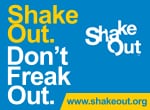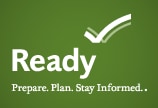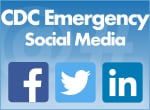Stay Safe After an Earthquake

Damaged buildings, damaged power lines, and leaking gas and water lines are just a few of the hazards you might face after an earthquake. Keep yourself and your loved ones safe after an earthquake by following the recommendations below.
Expect aftershocks.
- After an earthquake, you may experience aftershocks. Aftershocks are smaller earthquakes that follow a larger earthquake. These can happen minutes, days, weeks, or even months after an earthquake.
- If you feel an aftershock, DROP, COVER, and HOLD ON.
If you are trapped, attract attention to yourself.
- Try to attract attention to yourself. Send a text, bang on a wall or a pipe, or use a whistle to help rescuers find you.
- Protect your mouth, nose, and eyes from dust.
If you are in an area at risk for tsunamis, go inland and seek higher ground.
- In some cases, earthquakes can cause tsunamis in areas along the coast. These can happen minutes to hours after a strong earthquake.
- If you hear an official tsunami warning or notice signs of a tsunami, evacuate immediately. Get to higher ground as far inland as possible. Follow instructions from local authorities — they may direct you to a different route than you had planned.
- Visit the American Red Cross Tsunami Preparednessexternal icon webpage for information on how to prepare for and stay safe during and after a tsunami.
- Learn about health and safety risks from tsunamis.
Be careful near damaged buildings.
- Do not enter a damaged building. Earthquakes can damage buildings and make them unsafe. Wait until local authorities tell you it is safe to go inside.
- Leave your home or building if you hear shifting or unusual noises. Strange noises could mean the building is about to fall.
Inspect your home for damage.
- Carefully check your home’s walls, floors, doors, windows, and staircases for damage. If you see structural damage, like cracks in the foundation or missing support beams, you may need to relocate to a shelter or another safe location.
- Check gas, electrical, and water lines for damage. If you smell gas or see a broken line, shut off the main valve from the outside. (Note: if gas is turned off, a professional must restore service.)
- Do not use matches, lighters, appliances, or light switches until you are sure there are no gas leaks. Sparks from electrical switches could ignite gas, causing an explosion.
- For more information, visit American Red Cross – Checking Your Home: Structural Elementsexternal icon.
If the power is out, use flashlights instead of candles.
- If you must use candles, keep them away from anything that can catch fire. Always stay near lit candles.
- Keep a fire extinguisher handy, and make sure your family knows how to use it. Read the National Fire Protection Association’s tips for using fire extinguishersexternal icon.
- Learn more about hazards related to power outages.
Take care of any wounds or injuries to prevent infection.
- The risk for injury during and after an earthquake is high. Get first aid quickly to help heal small wounds and prevent infection.
- Learn more about proper wound care after a disaster.
If you can, help others in need.
- Check to make sure you are not hurt. If you are able, help others.
- Follow FEMA’s advice for how you can help othersexternal icon during an emergency.
Stay away from power lines.
- Watch out for fallen power lines that may be hanging overhead.
- Stay clear of fallen power lines. Call the electric company to report them.
- Learn more on how to protect yourself from electrical hazards after a disaster.
Prevent carbon monoxide poisoning.
Fuel-burning equipment creates carbon monoxide (CO). This can include equipment like generators, pressure washers, charcoal grills, and camp stoves. You can’t smell or see carbon monoxide, but if it builds up in your home, it can cause sudden illness and death.
- Never use portable gasoline or coal-burning equipment or camp stoves inside your home, basement, or garage. Keep it outside and at least 20 feet from any window, door, or vent.
- Use a battery-operated or battery backup CO detector any time you use a generator or anything else that burns fuel.
- If you have a CO detector and it starts beeping, leave your home right away and call 911.
Visit Preventing Carbon Monoxide Poisoning After an Emergency for more information.
Protect yourself from animals and pests.
- Stay away from wild or stray animals after an earthquake. Call 911 or your public health department to report them.
- Report dead animals to local officials.
- Learn more on how to protect yourself from animals or pests after a disaster.
Drink safe water. Eat safe food.
- Throw away perishable foods that have not been refrigerated properly due to power outages; also discard foods with an unusual odor, color, or texture. When in doubt, throw it out.
- Listen to reports from local officials for advice on water precautions in your home. Do not use contaminated water to make baby formula, make ice, brush your teeth, wash and prepare food, wash your hands, or wash dishes.
- Bottled, boiled, or treated water is safe for drinking, cooking, and personal hygiene. Your state, tribal, local, or territorial health department can make specific recommendations for boiling or treating water in your area.
- Learn more on how to keep food safe and use safe water after a natural disaster or emergency.
Clean up your home safely.
- Take steps to protect yourself and your loved ones during cleanup after an earthquake.
- Follow our cleanup tips and monitor your radio or television for up-to-date emergency information.
Stay connected and informed.
- Listen to receive emergency information and instructions from your battery-operated TV or radio, social media, or cell phone text alerts.
- Register to the American Red Cross Safe and Wellexternal icon This lets people know you are okay.
- Save phone calls for emergencies – text messages may be more reliable.
Take care of your emotional health.
During and after an earthquake, it is natural to experience different and strong emotions. Coping with these feelings and getting help when you need it will help you, your family, and your community recover from a disaster.
- Connect with family, friends, and others in your community.
- Take care of yourself and each other and know when and how to seek help.
- Learn more on how to take care of your emotional health after a disaster.


